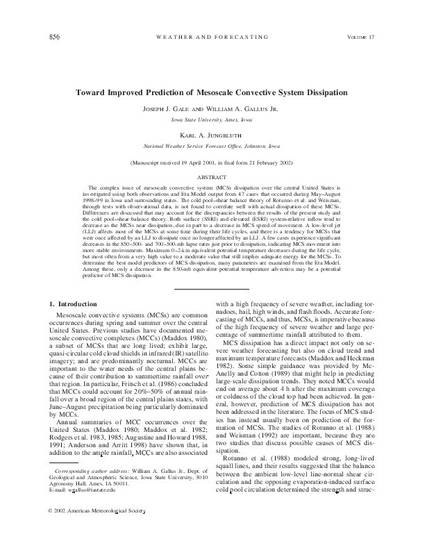
The complex issue of mesoscale convective system (MCS) dissipation over the central United States is investigated using both observations and Eta Model output from 47 cases that occurred during May-August 1998-99 in Iowa and surrounding states. The cold pool-shear balance theory of Rotunno et al. and Weisman, through tests with observational data, is not found to correlate well with actual dissipation of these MCSs. Differences are discussed that may account for the discrepancies between the results of the present study and the cold pool-shear balance theory. Both surface (SSRI) and elevated (ESRI) system-relative inflow tend to decrease as the MCSs near dissipation, due in part to a decrease in MCS speed of movement. A low-level jet (LLJ) affects most of the MCSs at some time during their life cycles, and there is a tendency for MCSs that were once affected by an LLJ to dissipate once no longer affected by an LLJ. A few cases experience significant decreases in the 850-500- and 700-500-mb lapse rates just prior to dissipation, indicating MCS movement into more stable environments. Maximum 0-2-km equivalent potential temperature decreases during the life cycle, but most often from a very high value to a moderate value that still implies adequate energy for the MCSs. To determine the best model predictors of MCS dissipation, many parameters are examined from the Eta Model. Among these, only a decrease in the 850-mb equivalent potential temperature advection may be a potential predictor of MCS dissipation.
Available at: http://works.bepress.com/william_gallus/41/

This article is from Weather and Forecasting 17 (2002): 856, doi: 10.1175/1520-0434(2002)017<0856:TIPOMC>2.0.CO;2. Posted with permission.